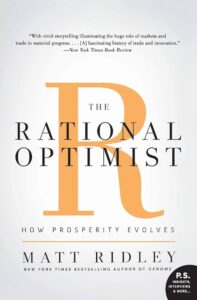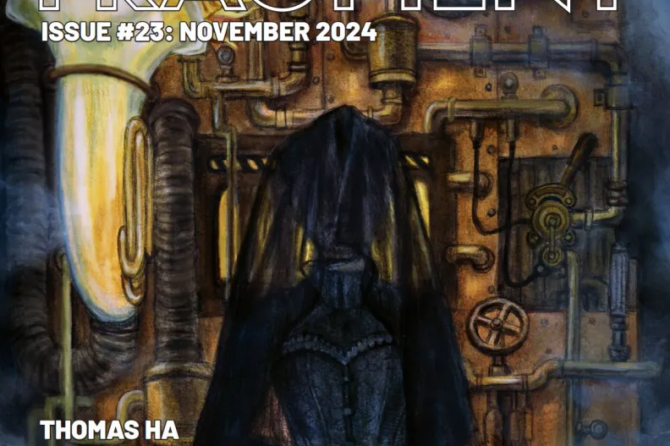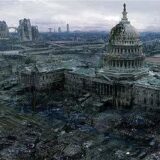
- Publisher: Harper Perennial
- Publication date: 06/07/2011
- Pages: 480
- ISBN: 9780061452062
- Author: Matt Ridley
The Rational Optimist by Matt Ridley begins with the premise that overall, the world has been improving for humanity pretty much ever since humanity came into existence. He goes further to postulate that the main reason for this increasing well being for humans is because we are the only species that trades with each other (to any meaningful extent). By trading with each other, it allows some people to specialize in one area and still survive as they receive other necessities by trading with others. Over time, this has allowed massive specialization to the point where some people can sit in an office all day and trade their knowledge and expertise via the open market and receive enough compensation to buy things like food, shelter, entertainment, transportation, etc.
To this point, I can’t argue very much with Ridley’s conclusions. It makes sense that a group of people who can specialize in different areas have the ability to be more successful that a group of individuals, each attempting to provide all the goods and services that that they themselves will need. Add to that stored learning, first by oral tales, then written and now electronic storage of information, that lets humans draw on, not just their own knowledge, but that of people who have lived throughout history. Add the ability to create specialized value and to trade that for other goods and services and you have the making of the most successful species on the planet with an ever increasing standard of living (with only the occasional set backs and collapse over the millennia).
Again, so far, I can buy into his arguments, but then he goes on. He goes on to suggest that the only time there are collapses is when the government (or other societal leadership) overreaches and tries to control free trade. This may be a slight overstatement of his premise, but only slight. He does not acknowledge that environmental collapses and over consuming and climatic issues have been directly responsible for many of the set backs and collapses in history (and pre-history). He glosses over the fact that many societies have outgrown their ability to manage the society and have been brought down, sometimes by internal issues and sometimes by external forces.
He criticizes the pessimists who have cried that the sky was falling from things like: not enough food to feed a growing population, smog growing denser from inefficient vehicles burning leaded fuels, holes in the ozone from chemical releases, etc. All of these things have been, if not solved, improved dramatically since these doomsayers made their proclamations. Human ingenuity continues to find ways to improve our lot and these issues continue to be mitigated. Human ingenuity and free trade will allow us all to keep solving every problem that occurs.
What he fails to acknowledge is that those creative actions that reduced the problems were brought about because people recognized the issue. People gave incentives, through government regulations, etc. for other people to come up with, and market, creative solutions to the issues. Free trade in and of itself would not have provided the incentive to switch to higher priced, but cleaner alternatives. He also misses that the societal collapses that took place in the past were localized to these particular regions. We are now in a global economy with a global society. A collapse today could affect billions and so it is even more important to have some of those pessimists calling out when potential issues are turning into real issues BEFORE they hit tipping points.
I really like the idea of being a Rational Optimist. I agree with Ridley that we can continue to improve the world and the well being of humans and humanity. I believe in science and technology and its ability to continue to lift us further as a species, and as a planet. I also understand that we need the doomsayers and the pessimists who look out for the potential damaging levers that could topple large sections of our planet and societies. I am an optimist because I know there are pessimists paying attention and who are willing to raise the red flags. And I believe, eventually, society and governments will recognize that we have to do something about those flags before they burst into flames and take us down with them. Free trade is great and important, but regulations and oversight are also important. I think Ridley missed the boat on the second set of needs.
_____
Speaking of potential environmental tipping points… Plastivore by Matt Truxaw













Recent Comments